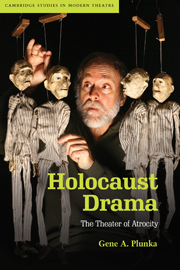Book contents
- Frontmatter
- Contents
- Acknowledgments
- 1 Introduction
- 2 Staging the Banality of Evil
- 3 Culture and the Holocaust
- 4 The Holocaust as Literature of the Body
- 5 Transcending the Holocaust
- 6 Marxism and the Holocaust
- 7 Aryan Responsibility During the Holocaust, I
- 8 Aryan Responsibility During the Holocaust, II
- 9 Heroism and Moral Responsibility in the Ghettoes
- 10 Dignity in the Concentration Camps
- 11 Holocaust Survivors in the United States and Israel
- 12 The Survivor Syndrome and the Effects of the Holocaust on Survivor Families
- 13 Holocaust Survivor Memory
- 14 The Holocaust and Collective Memory
- Notes
- Bibliography
- Index
14 - The Holocaust and Collective Memory
Published online by Cambridge University Press: 01 July 2009
- Frontmatter
- Contents
- Acknowledgments
- 1 Introduction
- 2 Staging the Banality of Evil
- 3 Culture and the Holocaust
- 4 The Holocaust as Literature of the Body
- 5 Transcending the Holocaust
- 6 Marxism and the Holocaust
- 7 Aryan Responsibility During the Holocaust, I
- 8 Aryan Responsibility During the Holocaust, II
- 9 Heroism and Moral Responsibility in the Ghettoes
- 10 Dignity in the Concentration Camps
- 11 Holocaust Survivors in the United States and Israel
- 12 The Survivor Syndrome and the Effects of the Holocaust on Survivor Families
- 13 Holocaust Survivor Memory
- 14 The Holocaust and Collective Memory
- Notes
- Bibliography
- Index
Summary
The uniqueness of the Holocaust has left us with a legacy in the form of a collective response to the trauma of atrocity. The Shoah has called into question the nature of humanity and civilization in a way fundamentally different from any other historical event. As Geoffrey H. Hartman has suggested, we, the nonparticipants, share with the survivors a type of trauma or breach in our traditional conception of human and civilized nature. This emotional burden, the capacity to act as a witness to the Holocaust, is something with which we are complicit. Marc Silverstein has described the notion of acting as witnesses for “the dead, the deported, the disappeared, the disenfranchised” as a challenge to live beyond ourselves, the only viable response to the ravages of our “post-traumatic century.” Nobel Prize-winning British playwright Harold Pinter's Ashes to Ashes best demonstrates how the Holocaust has been seared into our consciousness as collective memory and thus serves as a fitting conclusion to this book.
Pinter's first brush with the Holocaust was in his early teen years, growing up in East Hackney, London, during the air raids of World War II. Pinter recalls his backyard in flames from the bombings, forcing his family to evacuate the area frequently. As a Jew, Pinter understood the dark consequences of a German victory over the British and Allied forces.
- Type
- Chapter
- Information
- Holocaust DramaThe Theater of Atrocity, pp. 318 - 327Publisher: Cambridge University PressPrint publication year: 2009

